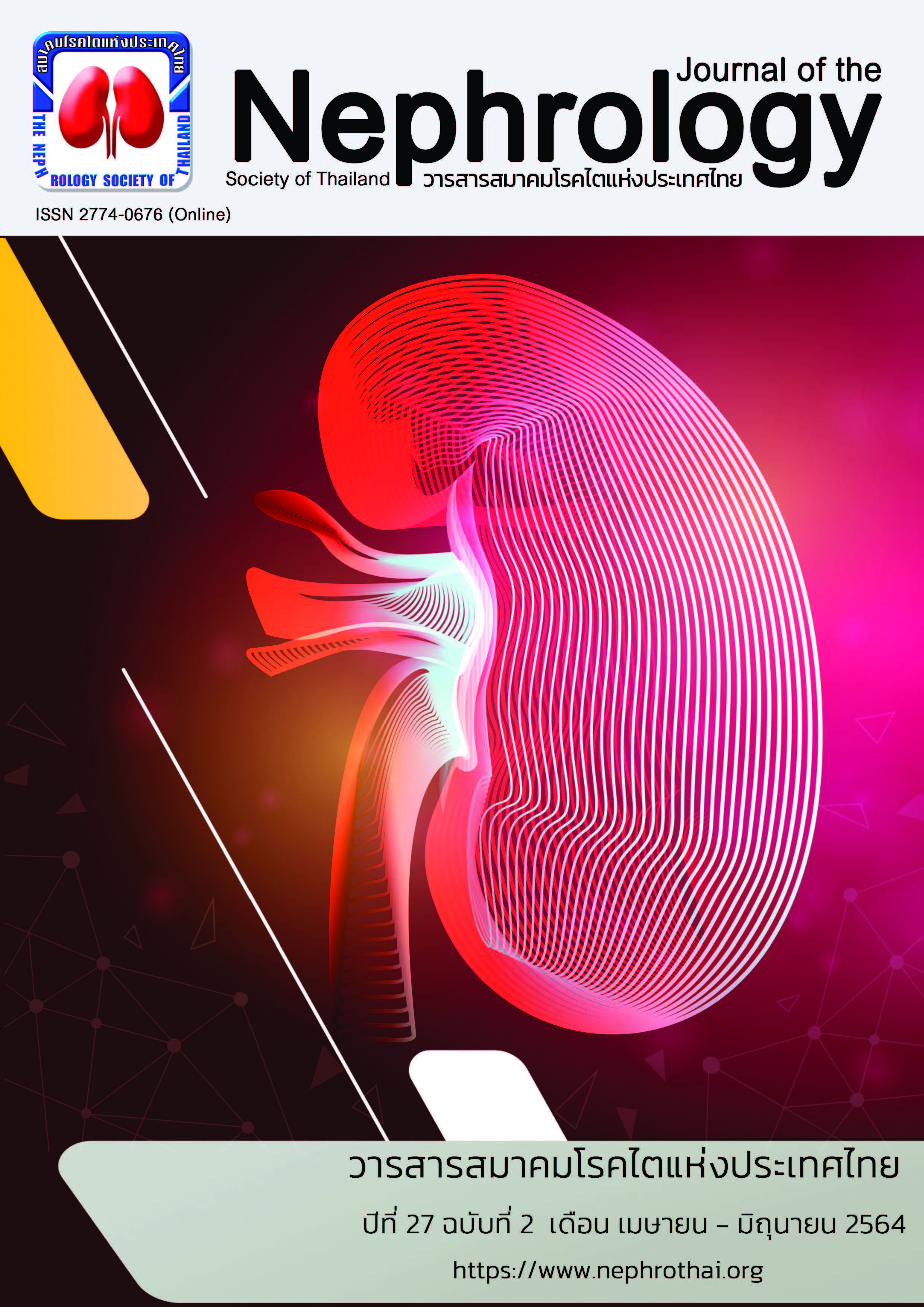Effect of cannabis and medical cannabinoids on kidney disease
Main Article Content
Abstract
According to the decriminalization policy, the use of cannabis and cannabinoid substances has increased over the past few years. Beyond the mental effects, cannabis and cannabinoids were prescribed for medical purposes which tended to enhance outcomes. In addition, exposure to marijuana and medical cannabinoids also increased among patients with chronic kidney disease. Numerous studies were conducted to demonstrate the chemical components of cannabis, and the evidence of efficacy and safety of cannabinoids in varied patient populations. Therefore, physicians should be knowledgeable and possess the ability to investigate the use of cannabinoids with their patients. In this review, we summarized the physiological effects of endocannabinoids and cannabinoid receptors in normal kidney tissue as well as changes in those with other kidney diseases. We also discussed the evidence of cannabinoid effects on short and long term kidney dysfunction, drug interactions, and the effect on kidney transplantation recipients.
Article Details

This work is licensed under a Creative Commons Attribution-NonCommercial-NoDerivatives 4.0 International License.
This article is published under CC BY-NC-ND 4.0 license, which allows for non-commercial reuse of the published paper as long as the published paper is fully attributed. Anyone can share (copy and redistribute) the material in any medium or format without having to ask permission from the author or the Nephrology Society of Thailand.
References
พระราชบัญญัติยาเสพติดให้โทษฉบับใหม่ (ฉบับที่ 7). 2562.
Chua JT, Argueta DA, DiPatrizio NV, Kovesdy CP, Vaziri ND, Kalantar-Zadeh K, et al. Endocannabinoid System and the Kidneys: From Renal Physiology to Injury and Disease. Cannabis Cannabinoid Res 2019;4:10-20.
A. M. Goldfrank’s Toxicologic Emergencies. In: Lewis S. Nelson NAL, Mary Ann Howland, Robert S. Hoffman, Lewis R. Goldfrank, Neal E. Flomenbaum, ed. Goldfrank’s Tox icologic Emergencies. 9 ed. New York: McGraw-Hill Edu cation; 2011.
Freeman TP, Hindocha C, Green SF, Bloomfield MAP. Medicinal use of cannabis based products and cannabi noids. BMJ 2019;365:l1141.
Park F, Potukuchi PK, Moradi H, Kovesdy CP. Cannabinoids and the kidney: effects in health and disease. Am J Physiol Renal Physiol 2017;313:F1124-F32.
Ho C, Martinusen D, Lo C. A Review of Cannabis in Chronic Kidney Disease Symptom Management. Can J Kidney Health Dis 2019;6:2054358119828391.
Mackie K. Cannabinoid receptors: where they are and what they do. J Neuroendocrinol 2008;20 Suppl 1:10-4.
Hsu YC, Lei CC, Shih YH, Ho C, Lin CL. Induction of proteinuria by cannabinoid receptors 1 signaling activation in CB1 transgenic mice. Am J Med Sci 2015;349:162-8.
Lecru L, Desterke C, Grassin-Delyle S, Chatziantoniou C, Van dermeersch S, Devocelle A, et al. Cannabinoid receptor 1 is a major mediator of renal fibrosis. Kidney Int 2015;88:72-84.
Mukhopadhyay P, Pan H, Rajesh M, Batkai S, Patel V, Har vey-White J, et al. CB1 cannabinoid receptors promote oxidative/nitrosative stress, inflammation and cell death in a murine nephropathy model. Br J Pharmacol 2010;160:657-68.
Horvath B, Mukhopadhyay P, Kechrid M, Patel V, Tanchian G, Wink DA, et al. beta-Caryophyllene ameliorates cisplatin-induced nephrotoxicity in a cannabinoid 2 receptor-dependent manner. Free Radic Biol Med 2012;52:1325-33.
Nettekoven M, Adam JM, Bendels S, Bissantz C, Fingerle J, Grether U, et al. Novel Triazolopyrimidine-Derived Cannabinoid Receptor 2 Agonists as Potential Treatment for Inflammatory Kidney Diseases. ChemMedChem 2016;11:179-89.
Jourdan T, Szanda G, Rosenberg AZ, Tam J, Earley BJ, Godlewski G, et al. Overactive cannabinoid 1 receptor in podocytes drives type 2 diabetic nephropathy. Proc Natl Acad Sci U S A 2014;111:E5420-8.
Hinden L, Udi S, Drori A, Gammal A, Nemirovski A, Hadar R, et al. Modulation of Renal GLUT2 by the Cannabinoid-1 Recep tor: Implications for the Treatment of Diabetic Nephropathy. J Am Soc Nephrol 2018;29:434-48.
Barutta F, Corbelli A, Mastrocola R, Gambino R, Di Marzo V, Pinach S, et al. Cannabinoid receptor 1 blockade ameliorates albuminuria in experimental diabetic nephropathy. Diabetes 2010;59:1046-54.
Udi S, Hinden L, Earley B, Drori A, Reuveni N, Hadar R, et al. Proximal Tubular Cannabinoid-1 Receptor Regulates Obesity-In duced CKD. J Am Soc Nephrol 2017;28:3518-32.
Swaminathan S, Rosner MH, Okusa MD. Emerging therapeu tic targets of sepsis-associated acute kidney injury. Semin Nephrol 2015;35:38-54.
Bhanushali GK, Jain G, Fatima H, Leisch LJ, Thornley-Brown D. AKI associated with synthetic cannabinoids: a case series. Clin J Am Soc Nephrol 2013;8:523-6.
Go AS, Parikh CR, Ikizler TA, Coca S, Siew ED, Chinchilli VM, et al. The assessment, serial evaluation, and subsequent sequelae of acute kidney injury (ASSESS-AKI) study: design and methods. BMC Nephrol 2010;11:22.
Ishida JH, Auer R, Vittinghoff E, Pletcher MJ, Reis JP, Sidney S, et al. Marijuana Use and Estimated Glomerular Filtration Rate in Young Adults. Clin J Am Soc Nephrol 2017;12:1578-87.
Ware MA, Wang T, Shapiro S, Collet JP, team Cs. Cannabis for the Management of Pain: Assessment of Safety Study (COM PASS). J Pain 2015;16:1233-42.
Greenan G, Ahmad SB, Anders MG, Leeser A, Bromberg JS, Niederhaus SV. Recreational marijuana use is not associated with worse outcomes after renal transplantation. Clin Transplant 2016;30:1340-6.
Leino AD, Emoto C, Fukuda T, Privitera M, Vinks AA, Alloway RR. Evidence of a clinically significant drug-drug interaction between cannabidiol and tacrolimus. Am J Transplant 2019;19:2944-8.
Zendulka O, Dovrtelova G, Noskova K, Turjap M, Sulcova A, Hanus L, et al. Cannabinoids and Cytochrome P450 Interactions. Curr Drug Metab 2016;17:206-26.
Alhamad T, Koraishy FM, Lam NN, Katari S, Naik AS, Schnitzler MA, et al. Cannabis Dependence or Abuse in Kidney Transplantation: Implications for Posttransplant Outcomes. Transplantation 2019;103:2373-82.


